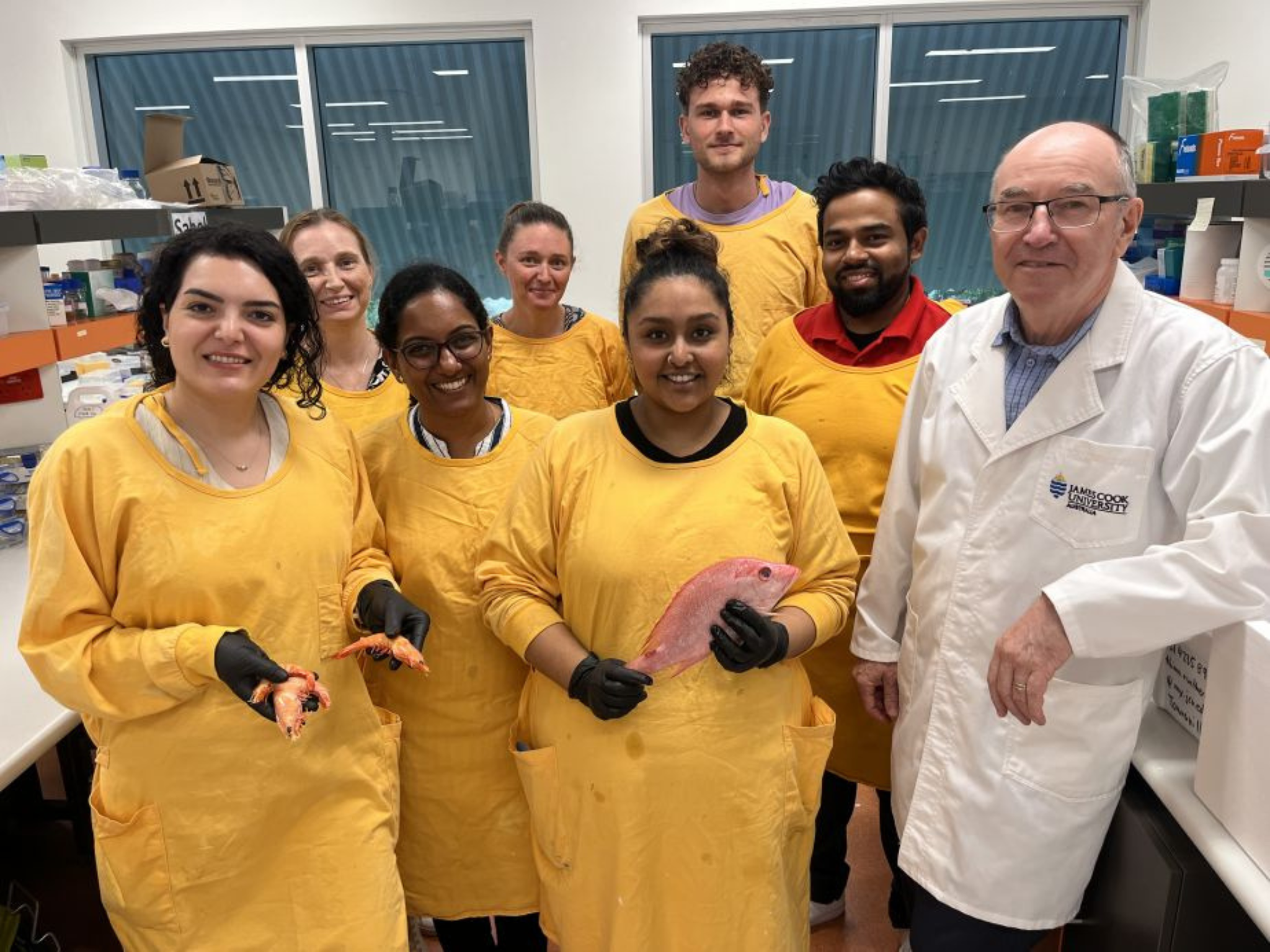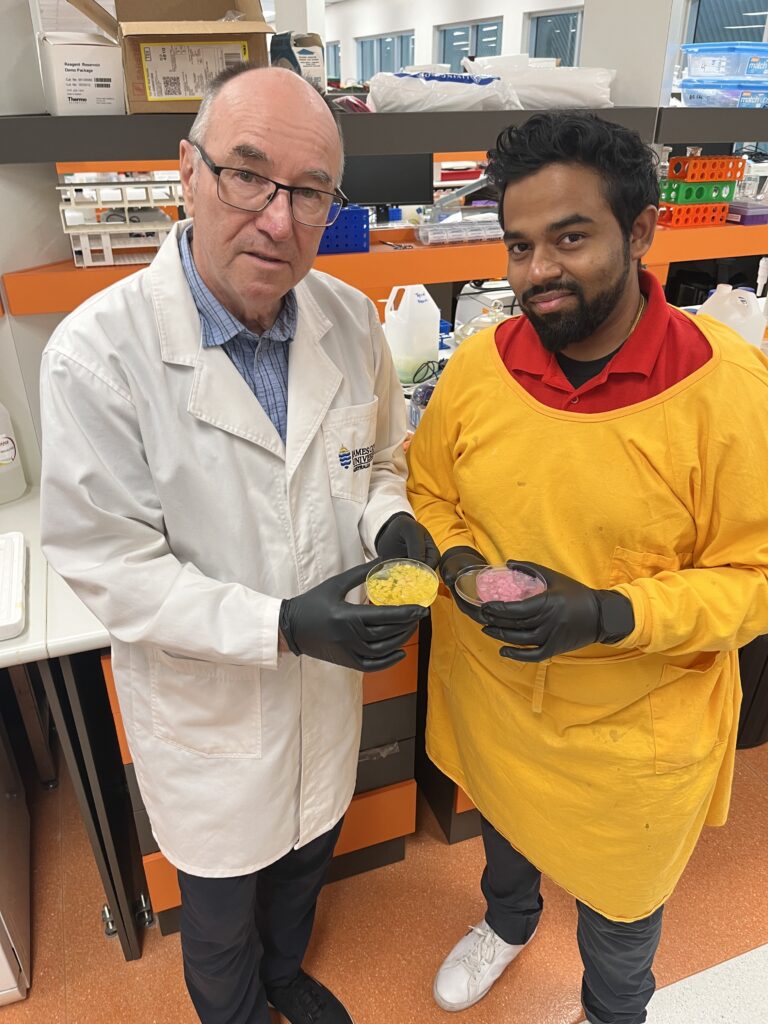
Cultivated seafood isn’t just better for marine animals, the planet, and human health – it can also bring fish back on the menu for those with severe allergies.
While many in the cellular agriculture industry have touted the health and climate advantages of cultivated meat and seafood, a new study highlights a hidden benefit of these proteins.
Globally, up to 7% of the population suffers from a seafood allergy, making fish a leading trigger of food-induced anaphylaxis. Cell cultivation can bring fish products back to these consumers’ plates, researchers at the James Cook University (JCU) have found.
“We have a data bank of over 100 children with confirmed fish allergies, and we demonstrated that there is very little to no reactivity to the known fish allergens in the cell-cultivated fish,” said Andreas Lopata, head of JCU’s Molecular Allergy Research Laboratory in Queensland, Australia, who called the results “hugely promising”.
Allergenicity of cultivated fish 10 times lower

The research dates back nearly a decade, with Lopata and his team working with children who had a clinical history of allergies to bony fish.
They evaluated allergy risks based on a multiomics approach for conventional and cultivated Japanese eel (or unagi), characterising each protein (and allergen) using computational methods.
The results, presented at the World Allergy Congress in San Diego, California (February 28 to March 3), revealed the abundance of 12 recognised fish allergens was 10-fold lower in the cultivated unagi than the conventional eel.
“The levels of allergens present in the cell-cultivated fish being so low was quite surprising to us,” said Lopata. “You’re basically taking stem cells from the fish, growing them in tissue culture to the size they are edible, and everyone told us it would basically be the same as the regular fish including any allergy risks.”
He added: “Instead, we found diminished risks, including a decrease of up to 1000-fold of the predominant fish allergen parvalbumin, and all of this was with no manipulation nor gene modification.”
The study further emphasises the need for serum-free culture media, since fetal bovine serum – a controversial ingredient the industry has been phasing out in recent years – introduced non-fish allergens to the products.
JCU working with cultivated seafood pioneer Umami Bioworks

JCU’s researchers argued that cultivated fish presents promising opportunities to produce safer seafood with diminished allergy risks. Now, it is conducting further research to evaluate a broader range of seafood cells, as well as develop cultivated fish products.
To advance that effort, it has partnered with alternative protein think tank the Good Food Institute (GFI) and Singaporean cultivated seafood startup Umami Bioworks.
“We have been collaborating to better understand the properties of cultivated seafood, how the products may differ from traditional seafood at a molecular level, and the impacts these differences may have on outcomes like allergenicity,” Umami Bioworks CEO Mihir Pershad told Green Queen, noting that the firm has a long-standing partnership with Lopata and JCU.
“To our knowledge, these are the first results on the potential allergenicity of cultivated meat and seafood and represent a significant step in building the public body of knowledge about the safety profile of cultivated foods,” he added.
“We are also excited by the potential demonstrated in this study for cultivated seafood to address challenges that our current seafood system cannot,” Pershad said, referring to the opportunity for people with seafood allergies to enjoy cultivated fish.
Lopata said Umami Bioworks’s first products will “most likely be cultivated fish and seafood dumplings”: “They should have that same fish flavour and omega-3 fatty acid levels, which are very healthy, along with all the other components of regular fish and seafood.”
He added: “There can be uncertainties about allergenicity, but that’s where we come in, as experts in the field, really analysing all proteins (the proteome) and then comparing particular allergen patterns to see if there could be anything unsafe for consumers.”
Umami Bioworks has been in “active review with documents submitted to regulators in major markets across America, Europe, and Asia”, Pershad told Green Queen in October. It’s a list that includes Singapore, the first country to greenlight the sale of cultivated meat, built on the rigorous yet inclusive food safety process designed by the Singapore Food Agency.
Could cultivated seafood go the plant-based dairy route?

Cultivated meat has gotten caught up in the culture wars. Some countries and US states have banned its production and sale, and many others are trying to do the same. These have contributed to consumer concern about the safety of these products, despite food safety authorities in several countries greenlighting the sale of cultivated meat after months (and sometimes years) of rigorous testing.
As this study suggests, cultivated seafood could be blessed with a wave of acceptance if it leans in on the anti-allergy positioning, similar to another alternative protein segment that has witnessed significant success using it, namely plant-based dairy.
Cow-free milk and dairy products have been successful despite the anti-vegan backlash because they cater to not just vegans but a large section of the population who are lactose-intolerant or suffer from dairy protein allergies – around two-thirds of people globally have trouble digesting lactose.
In the US, for instance, at least 12% of Americans are lactose-intolerant, while over 5% (15 million) have a milk or dairy allergy. While 44% of households buy plant-based milk, one in five Americans who did so also put cow’s milk in their shopping carts. In addition, the prevalence of intolerances and allergies has seen coffee chains like Starbucks and Dunkin’ face lawsuits over the non-dairy surcharge, which they have since dropped.
Can cultivated seafood recreate dairy-free products’ allergy-friendly strategy and become a more acceptable alternative protein to consumers?
The post Cultivated Seafood Can Fish Out Allergies, Unlocking A Hidden Benefit appeared first on Green Queen.
This post was originally published on Green Queen.